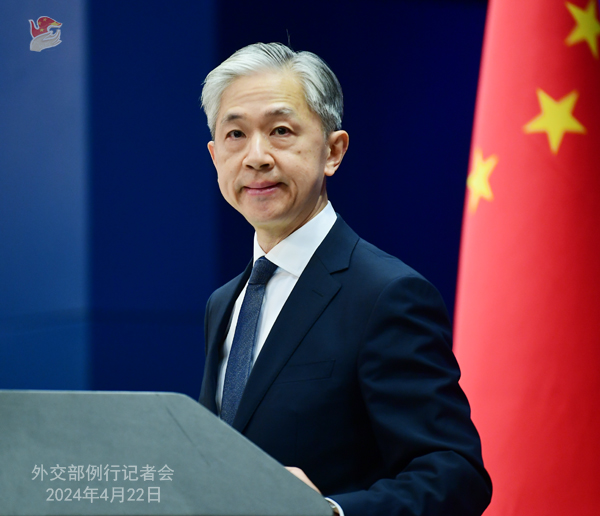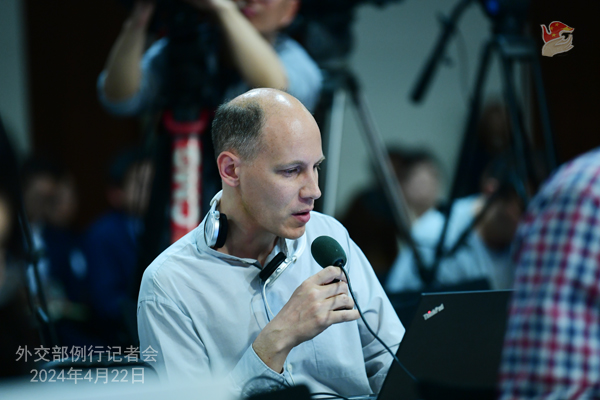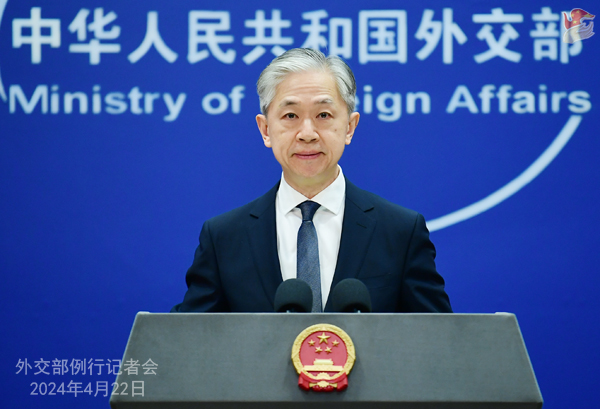
At the invitation of Member of the Political Bureau of the CPC Central Committee and Minister of Foreign Affairs Wang Yi, Minister of Foreign Affairs of Malaysia Dato’ Seri Utama Haji Mohamad bin Haji Hasan will pay an official visit to China from April 23 to 25.
At the invitation of Member of the Political Bureau of the CPC Central Committee and Minister of Foreign Affairs Wang Yi, US Secretary of State Antony Blinken will visit China from April 24 to 26.
Shenzhen TV: Foreign Minister Wang Yi paid an official visit to Papua New Guinea on April 20 at PNG’s invitation. Can you tell us more about the visit?
Wang Wenbin: From April 20 to 21, Member of the Political Bureau of the CPC Central Committee and Minister of Foreign Affairs Wang Yi visited Papua New Guinea, during which he had a meeting with the country’s Prime Minister James Marape and had talks and met the press together with Foreign Minister Justin Tkachenko.
Foreign Minister Wang Yi noted China always views and values the role of PNG from a strategic height. China will continue working with the PNG to deliver on the important common understandings reached by the two countries’ leaders, maintain high-level exchanges, start negotiations on a free trade agreement as soon as possible, enhance cooperation in sectors including trade and investment, infrastructure, agriculture, forestry and fishery, clean energy and climate response and further raise the height and quality of our comprehensive strategic partnership.
The PNG noted that China has been a sincere and good friend of Pacific Island countries. The cooperation between China and South Pacific Island countries contributes to regional development. PNG will not waver from its firm commitment to the one-China policy, and will maintain friendship with China under all circumstances.
During the visit, the two sides reached broad common understandings. They agreed that China and PNG will continue to trust and support each other, and firmly uphold and grow the comprehensive strategic partnership. China firmly supports PNG in safeguarding national sovereignty and territorial integrity and supports PNG in finding a successful development path that suits its national conditions.
The two sides agreed to always focus on development, deliver better lives for the people and advance mutually beneficial cooperation in various fields. Thanks to concerted efforts, China and PNG opened a direct flight, the first between the Chinese mainland and a PIC. The free trade agreement to be negotiated, which is also expected to be the first between China and a PIC, is truly something to look forward to. The two sides are committed to advancing practical cooperation with higher quality and faster speed and for greater results in such priority areas as disaster relief, telecommunications, agricultural trade and energy.
Both sides believe that the internal affairs of PICs brook no external interference, their right to independent development should not be denied and the peace and stability must be safeguarded. PICs have the right to carry out friendly cooperation with all development partners. China and PICs are all members of the Global South and the developing world. Between China and PICs, to help each other and deepen South-South cooperation is simply natural, fully justified and always done above-board. China sees PICs as indispensable partners in building a community with a shared future for mankind and always develops its relations with PICs under the principles proposed by President Xi Jinping, namely fully respecting the PICs’ sovereignty and independence, and their will, cultural traditions and effort to seek strength through unity. In providing assistance to PICs, China never attaches any political strings to such assistance, never imposes our will on others and never makes empty promises.
Foreign Minister Wang underscored that the island nations are the homeland of their peoples, not the “backyard” of any major country. Through AUKUS, the US is bent on bringing the development of nuclear submarine into the region, which violates the purposes of the South Pacific Nuclear Free Zone Treaty and creates severe risks of nuclear proliferation. Recently, the US has sought to bring even more countries into the grouping under false pretext. China has always opposed bloc confrontation in this region, for this is entirely the opposite of what PICs urgently need, nor is this consistent with the development trend of the world.
AFP: The World Anti-Doping Agency has confirmed on Saturday that nearly half of the swimming team that China sent to the Tokyo Olympics in 2021 tested positive for banned drug before the competition. Chinese state media have accused Western countries of conspiring against China. What’s your comment?
Wang Wenbin: I believe you have seen the explicit response from the World Anti-Doping Agency (WADA). The story you had seen in the press is false information and reporting.
After a full and thorough investigation into the incident in 2021, China Anti-Doping Agency concluded that, given that relevant athletes tested positive had ingested the substance unwittingly from tainted food, the Chinese swimmers concerned would be held to have no fault or negligence and the case did not constitute anti-doping rule violation. WADA after its review process recognizes China Anti-Doping Agency’s investigation results.
I wish to emphasize that the Chinese government has a zero-tolerance attitude toward doping and strictly abides by the World Anti-Doping Code. China is committed to protecting the physical and mental wellness of our athletes, ensuring fair competition in sport and contributing to the global anti-doping campaign.

Beijing Youth Daily: It’s reported that according to preliminary results released by the elections commission of the Maldives, People’s National Congress, the governing party led by President Mohamed Muizzu, won a landslide victory in parliamentary elections. What’s China’s comment?
Wang Wenbin: We congratulate the Maldives on the successful parliamentary elections and fully respect the choice of the Maldivian people.
China stands ready to work with the Maldives to carry forward traditional friendship, expand exchanges and cooperation in various fields, deepen China-Maldives comprehensive strategic cooperative partnership and speed up the building of a China-Maldives community with a shared future to deliver greater benefits to our two peoples.
TASS: Foreign ministers of the G7 issued a communiqué after their meeting in Italy last Friday, saying they are “concerned about the situation in the East and South China Seas” and reiterate their “opposition to any unilateral attempts to change the status quo.” The communiqué also mentioned issues related to Xizang, Hong Kong and Taiwan. What is the Foreign Ministry’s comment on this?
Wang Wenbin: We strongly deplore and firmly reject the manipulation of China-related issues at the G7 Foreign Ministers’ Meeting. The comments from the meeting are a deliberate mischaracterization of the facts and truth, and a blatant interference in China’s internal affairs.
China’s position on relevant issues is consistent and clear. The most effective way to ensure cross-Strait peace and stability is to uphold the one-China principle and oppose “Taiwan independence.” With the concerted efforts of China and ASEAN countries, the South China Sea has been generally peaceful and stable and there is no issue with freedom of navigation. China always puts the people at the center of its endeavors and strives to deliver the benefit of development to all Chinese people. Hong Kong has restored order and is set to thrive, and Xinjiang and Xizang enjoy social harmony, prosperity and stability where people of all ethnic groups live a happy life. A survey by a renowned international institution shows that the Chinese government’s satisfaction rate among the Chinese people has been above 90 percent for years running.
As the largest developing country, China is committed to the welfare of the world while working hard to achieve its own development. According to the World Bank, China’s contribution to global economic growth has long been higher than that of the G7 countries combined. China advocates an equal and orderly multipolar world and universally beneficial and inclusive economic globalization, upholds the purposes and principles of the UN Charter, and believes in open cooperation and mutual benefit. The G7, however, has held fast to the Cold-War mentality, cobbled together small exclusive groupings, and escalated regional tensions and conflicts. It has also engaged in trade protectionism and disrupted world economic order under the pretext of de-risking and less reliance. We urge the G7 to change the habit of deflecting blame, stop interfering in other countries’ internal affairs and holding back other countries’ development at once, and work with the rest of the world to uphold peace, enhance cooperation and advance development.
Hubei Media Group: It’s reported that the “Annual Spring Rites” of the Yasukuni Shrine began on April 21. On that day, Japanese Prime Minister Fumio Kishida, Speaker of the House of Representatives and President of the House of Councillors sent ritual offerings to the Yasukuni Shrine. Some Cabinet members visited and paid respects to the Shrine. What’s China’s comment?
Wang Wenbin: The Yasukuni Shrine is a spiritual tool and symbol of Japanese militarists responsible for the war of aggression. The place honors 14 convicted Class-A war criminals with grave responsibilities for the war crimes committed during that war of aggression. China firmly rejects Japan’s negative moves concerning the Yasukuni Shrine. China’s Ministry of Foreign Affairs and Embassy in Japan have respectively lodged serious démarches to the Japanese side. China urges Japan to earnestly honor its words and commitments of facing squarely and reflecting on the history of aggression, make a clean break with militarism and earn the trust of its Asian neighbors and the international community with concrete actions.
NHK: It’s been reported that a professor from a university in Japan has become unreachable since he returned to China last year. Does the Foreign Ministry know his whereabouts?
Wang Wenbin: I do not have information on that.
CCTV: It’s reported that in a statement released on April 20, Philippine’s National Security Adviser Eduardo Año said this administration is not aware of any secret or gentleman agreement with China and if there was such done under a previous administration, the same has been rescinded. He added that the discourse has been used to sow divisions in the Philippines and weaken its resolve in asserting the sovereignty in the South China Sea. He called on all Filipinos to stand their ground and push back against these corrosive narratives. What’s China’s comment?
Wang Wenbin: China and the Philippines reached common understandings on properly handling the situation at Ren’ai Jiao. These common understandings were reached not only during the Philippines’ previous administration but also its current administration. This is the plain fact, as evidenced by the Philippines’ media reports, statements of officials in the previous administration and how China and the Philippines handled the Ren’ai Jiao issue. The Philippines keeps denying these common understandings. What exactly is their issue? Is there something they are trying to hide?
It is in both China and the Philippines’ interest to keep the situation at Ren’ai Jiao stable, which is achievable if both sides observe those common understandings. Breach of commitments and provocations will only escalate the situation and eventually backfire on the Philippines itself. We hope the Philippines will face that squarely and decide sensibly what its action should be.


